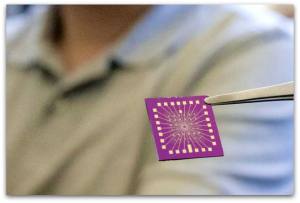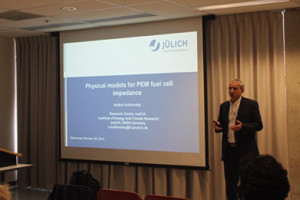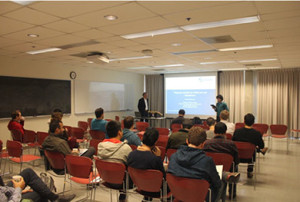 ECS is hosting a series of webinars presented by distinguished speakers this June. Join us! Speakers include Harry Atwater from the California Institute of Technology, Arumugam Manthiram from the University of Texas at Austin, and Paul Kenis from the University of Illinois at Urbana-Champaign. Topics include batteries, energy, carbon, and more. Considering attending? Learn more about what you can expect to hear about from our presenters! (more…)
ECS is hosting a series of webinars presented by distinguished speakers this June. Join us! Speakers include Harry Atwater from the California Institute of Technology, Arumugam Manthiram from the University of Texas at Austin, and Paul Kenis from the University of Illinois at Urbana-Champaign. Topics include batteries, energy, carbon, and more. Considering attending? Learn more about what you can expect to hear about from our presenters! (more…)
ECS will be offering five short courses at the 229th ECS Meeting this year in San Diego.
What are short courses? Taught by academic and industry experts in intimate learning settings, short courses offer students and professionals alike the opportunity to greatly expand their knowledge and technical expertise.
Short Course #3: Advanced Impedance Spectroscopy
Mark Orazem, Instructor
This course is intended for chemists, physicists, materials scientists, and engineers with an interest in applying electrochemical impedance techniques to study a broad variety of electrochemical processes. The attendee will develop a basic understanding of the technique, the sources of errors in impedance measurements, the manner in which experiments can be optimized to reduce these errors, and the use of graphical methods to interpret measurements in terms of meaningful physical properties.
On October 26th, 2015, the ECS British Columbia Student Chapter held its 1st Annual Academic Workshop.
The workshop was held at the Molecular Biology and Chemistry Building located at Simon Fraser University in British Columbia, Canada. It attracted nearly 40 attendees from all different departments and disciplines at The University of British Columbia, Simon Fraser University and Tsinghua University, China. Also in attendance was the Chair of ECS Canada Section, Dr. Michael Eickerling.
The attendees were given a detailed presentation from Dr. Andrei Kulikovsky on the topic of Physical Models of Impedance Spectroscopy for PEM fuel cells. Dr. Kulikovsky visited all the way from Germany for the workshop, where he is involved in modeling fuel cell components and stacks. Within the past fifteen years, Dr. Kulikovsky has published more than seventy research papers.
In 2012, he published a one-of-a-kind book called Analytical Modeling of Fuel Cells. This book is the first monograph on modeling of polymer electrolyte, direct methanol and solid oxide fuel cells performance. Dr. Kulikovsky’s current research interests include modeling of fuel cells and catalyst layers.
Congratulations on a successful workshop!
 A tiny chip may be the answer to the wide-spread utilization of fuel cells.
A tiny chip may be the answer to the wide-spread utilization of fuel cells.
A team of researchers from UCLA have developed a nanoelectronic chip that can accurately analyze the chemical reactions that allow fuels cells and batteries to function. The new chip effectively evaluates at the nano level how nanocatalysts convert chemical reactions into electricity.
New Insights About Fuel Cells
Essentially, the chip scales down spectroscopy—doing what a large laboratory would typically do, only more effectively and with the ability to collect new data.
This from UCLA:
Being able to analyze these reactions with increased accuracy, heightened sensitivity and greater cost-effectiveness will vastly improve scientists’ understanding of nanocatalysts, which will enable the development of new environmentally friendly fuel cells that are more efficient, more durable and less expensive to produce. Eventually, those new fuel cells could be used to power vehicles that run on hydrogen, the 10th most abundant element on Earth, and give off water as exhaust.
Four Short Courses will be offered in Cancun on Sunday, October 5, 2014 at the start of the 2014 ECS and SMEQ Joint International Meeting .
ECS Short Courses are all day instruction designed to provide students or the seasoned professional a wide range of topics. Taught by industry experts, the small class size makes for an excellent opportunity for personalized instruction.
The registration fee for the Short Courses is $425 for ECS Members and $520 for Nonmembers. Students may register for a Short Course at a 50% discount—ECS Student Members: $212.50, and Nonmember Students: $260.
The registration fee for the course includes participation in the course, text materials, continental breakfast, luncheon, and refreshment breaks. The Short Course registration fee does not include or apply to the general Meeting Registration, and it is not applicable to any other activities of the meeting.
Here’s the line up:




